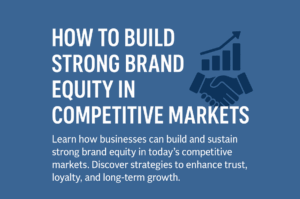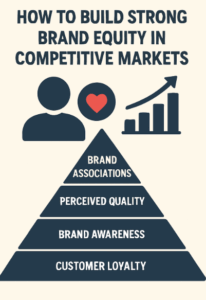How to Build Strong Brand Equity in Competitive Markets
In today’s global economy, competition among businesses is fiercer than ever. Companies are no longer competing only on price or product features; they are competing on perception, reputation, and emotional connection with customers. This is where brand equity comes into play. Brand equity refers to the value a brand adds to a product or service, beyond its functional benefits. Strong brand equity can help businesses command premium pricing, maintain customer loyalty, and achieve long-term growth.

This article explores the importance of brand equity and outlines practical strategies to build and sustain it in competitive markets.
What Is Brand Equity?
Brand equity can be defined as the overall value of a brand in the marketplace. It represents the intangible assets of a brand, such as customer perceptions, brand associations, and emotional attachment. Companies with high brand equity, like Apple, Nike, or Coca-Cola, benefit from stronger consumer trust, better recognition, and consistent sales even during tough times.
In simple terms, brand equity is the reason why customers choose one brand over another, even when the alternatives offer similar products at lower prices.
Why Brand Equity Matters
Building strong brand equity offers several advantages:
- Customer Loyalty: Customers are more likely to return to a brand they trust.
- Premium Pricing: Strong brands can charge higher prices without losing customers.
- Competitive Advantage: A well-established brand is harder to replace.
- Business Growth: Strong equity attracts partnerships, investors, and long-term opportunities.
In competitive markets, these benefits are critical for survival and expansion.
Strategies to Build Strong Brand Equity

- Deliver Consistent Quality
The foundation of brand equity is trust, and trust begins with consistent product or service quality. Customers expect reliability every time they engage with a brand. Businesses must focus on delivering value that meets or exceeds expectations. Consistency builds confidence, which directly enhances brand equity.
- Create a Unique Brand Identity
Strong equity is built on a clear and recognizable identity. This includes a memorable logo, appealing design, brand voice, and messaging that resonates with the target audience. Brands like Starbucks or Tesla stand out because they have unique identities that differentiate them from competitors.
- Focus on Customer Experience
Brand equity is not just about marketing—it is about every interaction customers have with a company. From the website experience to customer support and product delivery, every touchpoint matters. Exceptional customer experience turns buyers into loyal advocates, increasing both brand awareness and equity.
- Build Emotional Connections
Brands that connect with customers on an emotional level enjoy stronger equity. Emotions drive purchasing decisions more than rational arguments. Storytelling, community engagement, and values-driven marketing can help create lasting emotional bonds with consumers.
- Invest in Marketing and Communication
Effective branding requires clear and consistent communication. Companies should invest in digital marketing, social media, and content creation that reinforces brand values. By staying visible and relevant, businesses can strengthen consumer perceptions and brand equity.
- Encourage Customer Loyalty Programs
Loyalty programs, rewards, and personalized offers encourage repeat purchases. This not only boosts short-term sales but also builds long-term loyalty, which is a critical factor in brand equity development.
Common Challenges in Building Brand Equity
While building strong brand equity is rewarding, it comes with challenges:
- Intense Competition: In crowded markets, it can be difficult to stand out.
- Changing Consumer Preferences: Brands must adapt quickly to trends and demands.
- Negative Publicity: A single negative incident can damage years of equity-building.
- Short-Term Focus: Companies that prioritize quick sales over long-term branding risk losing equity.
Overcoming these challenges requires a balance of innovation, adaptability, and consistent effort.
Long-Term Perspective on Brand Equity
Strong brand equity is not built overnight. It requires years of consistent effort, innovation, and dedication to customer satisfaction. Businesses that view brand equity as a long-term investment are more likely to thrive in competitive markets. The payoff includes loyal customers, stronger financial performance, and a lasting place in the market.
In an era where markets are increasingly competitive, brand equity is one of the most powerful assets a company can build. It goes beyond sales numbers and marketing campaigns—it reflects the trust, recognition, and emotional connection that customers have with a brand.
By delivering consistent quality, creating a unique identity, focusing on customer experience, and fostering emotional connections, businesses can develop strong brand equity that ensures long-term success. Ultimately, brand equity is the foundation for sustainable growth and a shield against competition.




